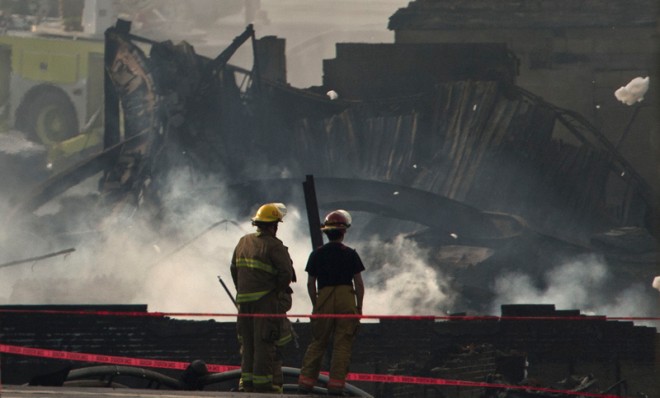How can we prevent another Quebec oil train explosion?
Some say transferring hazardous materials by rail is just a bad idea

A free daily email with the biggest news stories of the day – and the best features from TheWeek.com
You are now subscribed
Your newsletter sign-up was successful
Regulators have been scrambling to figure out how a series of oil tankers could have rammed into the Quebec town of Lac-Mégantic earlier this month, killing dozens of people.
For those who missed the story and its shocking images, 72 rail cars filled with crude oil mysteriously jumped the tracks early in the morning July 6 near Lac-Mégantic, and proceeded to smash into a busy downtown area, exploding into a scorching fire that killed at least 47 people. The exact number of deaths is unclear, because some people remain listed as missing.
Though investigators have yet to release a report on the official cause, they say the evidence suggests that insufficient hand brakes were set when the train was left unattended.
The Week
Escape your echo chamber. Get the facts behind the news, plus analysis from multiple perspectives.

Sign up for The Week's Free Newsletters
From our morning news briefing to a weekly Good News Newsletter, get the best of The Week delivered directly to your inbox.
From our morning news briefing to a weekly Good News Newsletter, get the best of The Week delivered directly to your inbox.
So how can regulators prevent another disaster like this one? On Tuesday, Canadian transportation authorities churned out a set of six emergency rules effective immediately, while a new review of hazardous material transportation was also unveiled.
One of the six emergency measures is that trains transporting hazmat must have two qualified operators, not one, which could help prevent another brake mishap. But other dangers persist, including that tank cars are known to sprout holes and rupture during accidents, increasing the chance of an explosion.
This issue was only partly addressed two years ago, when the industry passed a set of tougher standards, including requiring new cars to be more puncture-resistant, with tougher shields at the front and back. At the time, the industry considered retrofitting old cars as well, but decided against it. "The cost would be extraordinary," a marketing issues manager for the American Petroleum Institute recently told The Wall Street Journal.
"Retrofitting existing product would be a huge problem, and we think unnecessary," added an executive of the Renewable Fuels Association, which represents ethanol companies.
A free daily email with the biggest news stories of the day – and the best features from TheWeek.com
The residents of Lac-Mégantic might think otherwise.
However, the most efficient way to safety, argue some, is simply transporting fewer hazardous materials by train. Instead, rail transports of crude oil have actually increased in recent years, with oil companies discovering new reserves like Alberta's oil sands in Canada. Crude oil shipments by rail grew to 233,811 carloads last year, from 9,500 carloads in 2008, according to The Boston Globe:
"Pipelines are the safest way to ship many hazardous materials, but face serious community opposition," says the Globe. "Shipping by barge is also a safer option in some areas."
Carmel Lobello is the business editor at TheWeek.com. Previously, she was an editor at DeathandTaxesMag.com.
-
 Political cartoons for February 21
Political cartoons for February 21Cartoons Saturday’s political cartoons include consequences, secrets, and more
-
 Crisis in Cuba: a ‘golden opportunity’ for Washington?
Crisis in Cuba: a ‘golden opportunity’ for Washington?Talking Point The Trump administration is applying the pressure, and with Latin America swinging to the right, Havana is becoming more ‘politically isolated’
-
 5 thoroughly redacted cartoons about Pam Bondi protecting predators
5 thoroughly redacted cartoons about Pam Bondi protecting predatorsCartoons Artists take on the real victim, types of protection, and more